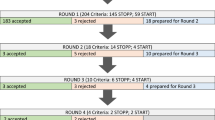Abstract.
The United Kingdom Department of Health initiative on “The Expert Patient” (2001) reflects recent trends in political philosophy, ethics and health services research. The overall objective of the initiative is to encourage patients, particularly those suffering from chronic conditions to become more actively involved in decisions concerning their treatment. In doing so there would be (perhaps) an expectation of better patient compliance and (arguably) a resultant improvement in quality of life. Despite these anticipated beneficial influences on health outcomes, there may be a danger that such initiatives are being carried along by the general swell of enthusiasm for recognising and facilitating the claims of disadvantaged or discriminated against groups. What more attractive than that patients should be “liberated” from what might be seen as the oppression of medical paternalism? To a great extent the potential for success of the Expert Patient venture turns on:
(a) whether and to what extent a patient can be considered truly to be an expert and
(b) full acceptance by the medical and heath care professions of allowing patients a more equitable and positive role.
Whilst clearly the patient is an expert in the hermeneutic sense – it is they and they alone who experience their illness – there is nevertheless a risk of confusing experience with expertise. Experience limited to an individual does not of itself give rise to the generalisations that underlie reliable clinical treatment. Neither do the vast majority of patients possess the physiological and pharmacological knowledge to fully appreciate the biological nature of their illness nor the basis, risks or limitations of therapeutic measures. Might the notion of “The Expert Patient” as informed co-decision maker become a well-meaning but rather vacuous aspiration similar to that of informed consent? Even worse, could patient “empowerment” have a deleterious effect? The paper reviews some of the major issues and concludes that the expert patient initiative could have benefits for both patients and health professionals if operated on the basis of concordance: an informed collaborative alliance that optimises the potential benefits of medical care.
Similar content being viewed by others
References
InstitutionalAuthorNameDepartment of Health (2001) The Expert Patient: A New Approach to Chronic Disease Management for the 21st Century Department of Health London
Honneth A. (1996), The Struggle for Recognition The Moral Grammar of Social Conflicts. Cambridge MS: MIT Press.
J.S. Mill (1859) ‘On Liberty’ J. Gray (Eds) On Liberty and Other Essays Oxford World’s Classics Oxford 1–128
R. Sennett (2003) Respect: The Formation of Character in an Age of Inequality Allen Lane London
C. Taylor (1997) Philosophical Arguments Harvard University Press Cambridge MS and London
B.S. Turner (1987) Medical Power and Social Knowledge Sage Publications London
Author information
Authors and Affiliations
Corresponding author
Rights and permissions
About this article
Cite this article
Badcott, D. The expert patient: Valid recognition or false hope?. Med Health Care Philos 8, 173–178 (2005). https://doi.org/10.1007/s11019-005-2275-7
Issue Date:
DOI: https://doi.org/10.1007/s11019-005-2275-7




